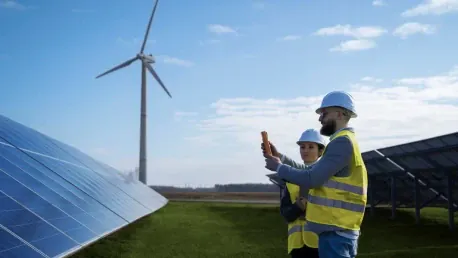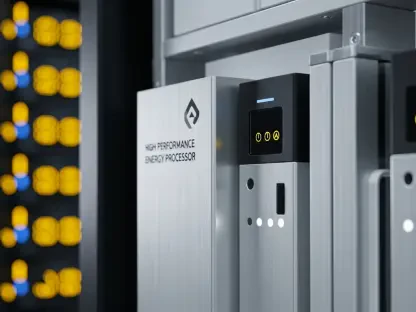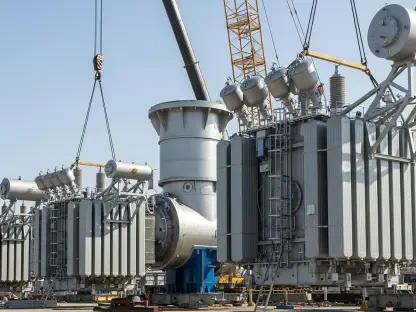Germany is redefining its energy landscape with impressive advancements in renewable energy, making significant strides towards ambitious climate goals. With notable increases in both solar and wind energy capacities, legislative initiatives, and innovative projects, the nation is poised for a sustainable future. The surge in renewable energy capacity has been driven by various factors, including government policies, technological innovations, and a strong national commitment to reducing carbon emissions. This transformation not only positions Germany as a leader in the renewable energy sector but also serves as a model for other countries aiming to achieve similar climate goals.
Surge in Renewable Energy Capacity
Germany’s Federal Network Agency has reported an impressive rise in renewable energy capacity, reaching nearly 190 GW by the end of 2024. This 12 percent increase predominantly stems from the surge in solar and wind power sectors. With 99.3 GW from solar installations and substantial growth in wind energy, renewable sources now account for almost 60 percent of the country’s electricity generation. This significant shift towards renewable energy has had a notable impact on reducing the reliance on coal and other fossil fuels, thus contributing to a cleaner environment.
Notably, the solar sector has seen significant expansion through rooftop, building, and facade installations. Onshore and offshore wind capacities have also experienced growth, with new turbines in the Baltic and North Seas contributing to the overall renewable energy surge. These advancements have not only enhanced Germany’s energy security but have also created numerous employment opportunities in the renewable energy sector. Additionally, the increased investment in research and development has led to technological innovations that further optimize the efficiency and effectiveness of renewable energy systems.
Legislative Reforms Paving the Way
Germany’s energy transformation is further bolstered by policy reforms to the Renewable Energy Sources Act (EEG) and the Energy Industry Act (EnWG). These regulations have been designed to integrate renewable energies effectively into the power grid, focusing on photovoltaic system market integration and advanced digitalization for power management. The main aim of these legislative reforms is to streamline the processes involved in renewable energy deployment, making it easier for new projects to come online and contribute to the national grid.
Additionally, amendments have optimized biogas plant operations and ensured secure follow-up funding. Changes in funding criteria for combined heat and power (CHP) plants have extended investment security, a vital step towards achieving energy transition goals. These reforms also address the challenges related to energy storage and grid stability, ensuring that the increasing share of renewable energy does not compromise the reliability of the power supply. By fostering a conducive regulatory environment, Germany is well on its way to achieving its climate targets while maintaining economic growth and stability.
Accelerated Wind Energy Roll-Out
Germany’s streamlined approval processes have significantly shortened wind turbine project timelines. Previously taking four to five years, approval procedures now average one and a half years, with specific regions experiencing approval processes as short as 16 months. This acceleration is critical in positioning Germany as Europe’s leader in wind turbine construction and is expected to play a significant role in meeting the country’s renewable energy targets. The efficiency in these processes highlights the government’s commitment to fast-tracking the deployment of renewable energy projects.
The rapid growth in wind capacity is expected to continue, with the Goal100 think tank suggesting that Germany could surpass its 2030 wind capacity targets. Federal mandates for land allocation are playing a crucial role in this expansion, facilitating the country’s annual wind capacity increase. The proactive steps taken to simplify and expedite approval processes are likely to serve as a blueprint for other European nations looking to enhance their renewable energy infrastructure.
Innovative Energy Projects
One of the world’s largest seawater heat pumps has been commissioned by Flensburg in northern Germany. The 60 MW pump, a EUR 70 million project by Johnson Controls, will provide heating for a significant portion of the city’s residents by 2027. This innovation is part of Flensburg’s broader climate initiative to achieve neutrality by 2035, exemplifying the city’s forward-thinking approach to sustainable energy solutions. The implementation of such large-scale projects showcases Germany’s commitment to exploring and deploying a diverse array of renewable energy technologies.
The pump will utilize thermal energy from the Flensburg Fjord, underscoring the city’s commitment to sustainable energy solutions. Additional seawater pumps are planned to reinforce these efforts, highlighting the local-level contributions to national climate goals. By investing in innovative projects like the seawater heat pump, Germany is not only addressing its energy needs but also setting a global example for sustainable practices.
Conclusion
Germany is transforming its energy sector with remarkable progress in renewable energy, making considerable headway towards ambitious climate targets. The nation has seen significant growth in both solar and wind energy capacities, backed by legislative measures and innovative projects, positioning itself for a sustainable future. This surge in renewable energy is driven by various factors, including progressive government policies, technological advancements, and a strong national resolve to cut carbon emissions. This shift not only establishes Germany as a leader in the renewable energy industry but also sets a powerful example for other nations pursuing similar environmental objectives. The country’s commitment is evident through its strategic investments, research in energy storage, and efforts to enhance grid stability. By embracing renewable energy, Germany is not only addressing its immediate energy needs but also contributing to global climate action efforts, showcasing how a nation can transition towards a greener economy while ensuring energy security and environmental stewardship.









